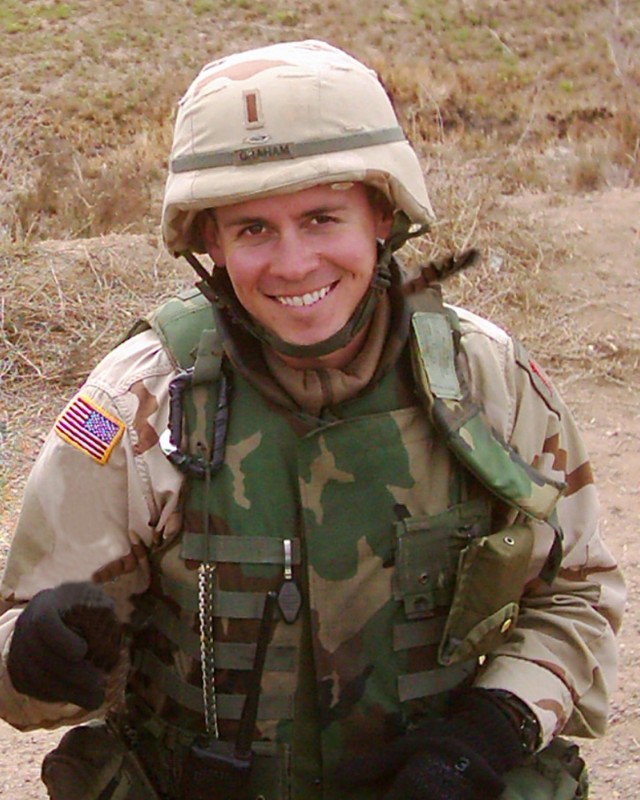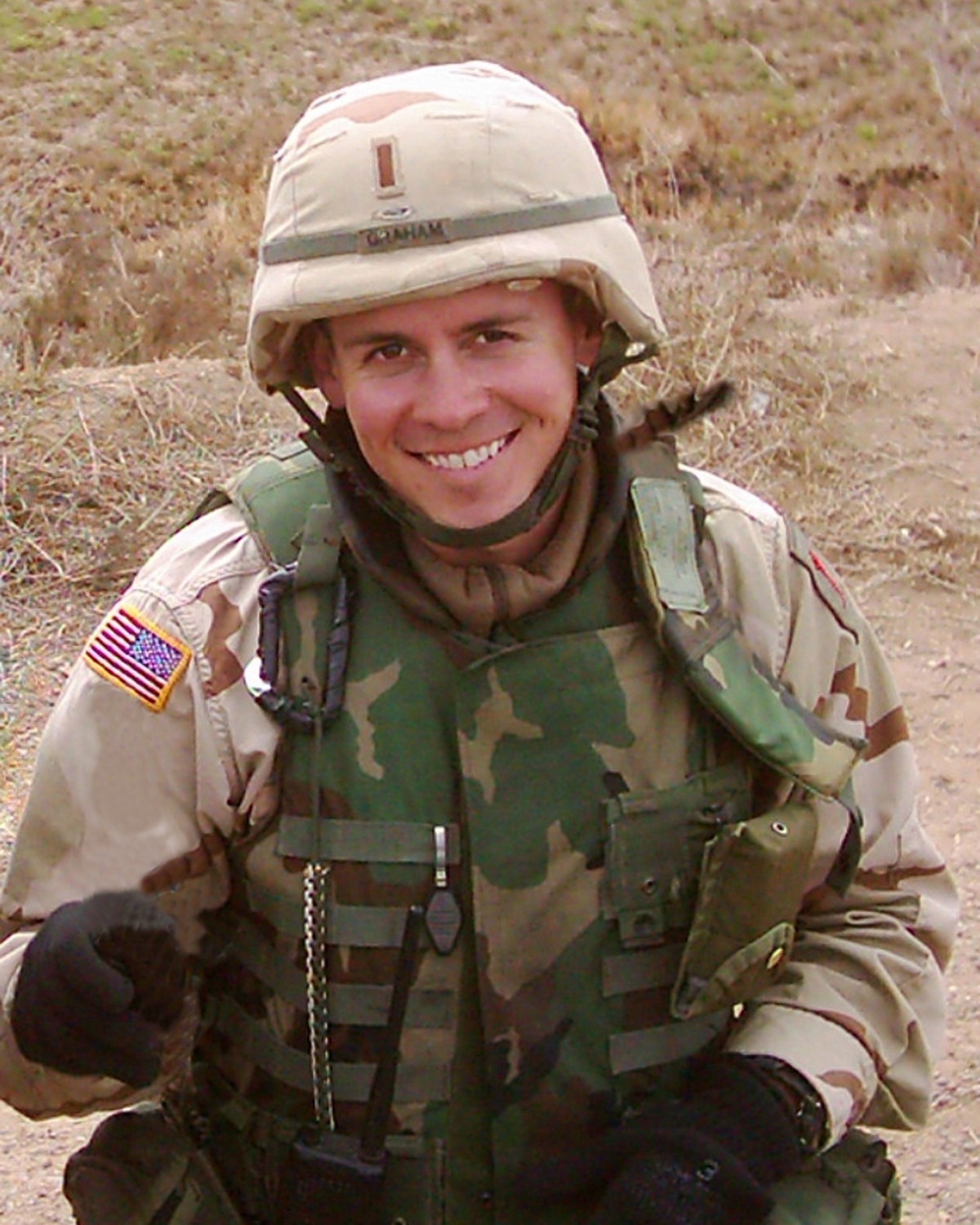For every Soldier killed by a sniper or an improvised explosive device, there are other, forgotten victims. Friends and family members of the dead are left to pick up the pieces and find some way to go on living.
But how do parents survive the loss of a child' How do they get out of bed each morning' How do they smile or laugh again'
It's almost impossible, said Carol Graham and Deborah Tainsh, two military wives and mothers whose sons were killed in Iraq. The pain is indescribable, they said.
"That knock on the door before the sun even rises, that's something that never leaves your mind," Tainsh said. "A certain part of you is dead from that day forward. Whereas most young spouses will move on, parents don't. We're stuck. All we do is search for a way to give our lives meaning in order to wake up every day.
"You get up every day saying, 'My son was a hero, he served this nation and this world in an honorable manner.' I will take that forward to let others know that he represents service to others, and his legacy will go on."
The only way to survive, the women agreed, is to find a new purpose in life. For both Tainsh and Graham, that purpose has become keeping their sons' memories alive. Both families have set up memorial projects and work to comfort other grieving families.
"It does keep us going," said Graham. She and her husband, Maj. Gen. Mark Graham, commander of Fort Carson, Colo., have lost two sons. Kevin, their younger son and a Reserve Officer Training Corps cadet, committed suicide in 2003. Just days after his funeral, his older brother, Jeffrey, already a second lieutenant, decided he couldn't take the stateside assignment he'd been offered and deployed to Iraq as scheduled.
"I was so numb," Graham said. "Kevin looked to us for guidance, which is one reason we feel like we failed him. Jeffrey was very strong-willed. He had a mission. Jeffrey believed it was something he had to do. We didn't really say very much. I remember once, my husband said, 'Well, what if he stays at Fort Knox and gets in a horrible car wreck'' You don't know what to do."
She added that she never really believed they could lose another son, but only seven months later, in February 2004, an IED claimed Jeffrey. He had just enough time to warn his unit and save other lives.
"I can remember so clearly that morning," she said. "I'd gotten up about 5 a.m., only to learn on the Internet that two Soldiers had been killed. I asked Mark if we would know by now if it was Jeffrey or not. Deep in my spirit, I had a feeling it was him, but the rational side of my brain could not even begin to think that it could be our son. It could just not be true. Not again."
Tainsh and her husband, David, a retired Marine sergeant major, lost his son and her stepson, Sgt. Patrick Tainsh, in Iraq that February as well. Severely wounded when his convoy was ambushed outside Baghdad Airport, he fired more than 400 rounds from two weapons to protect his comrades. When the battle ended, he died in his commander's arms. He was posthumously awarded the Silver Star, Bronze Star and Purple Heart. Tainsh told her stepson's story in "Heart of a Hawk: One Family's Sacrifice and Journey Toward Healing."
"You send your children out the door every day and you just take for granted that they're coming back, even when you send them off to war," she said. "It is a tremendous weight on the soul when parents send their children off to war. Your child is out there protecting you when that's what you're supposed to be doing for him."
After the funeral, she said, everyone else went back to their lives, but she and her husband could only go back to an empty, quiet house, completely shattered. Tainsh said they have lost the future: they'll never plan their son's wedding or have grandchildren. No one will carry on their name. They've also lost his fiancAfAe, who was once like a daughter to them. They don't even put up a Christmas tree anymore.
Mrs. Graham added that while their friends' children graduated, married and had children, they wondered how the world could keep spinning without their sons. They cried in church when the prayers of others were answered.
Mrs. Tainsh said the worst question she and her husband are asked is if they have other children. She has a son from her first marriage, but she doesn't understand why this matters. She said another grieving mother tells others: "Think of a car. The car runs great with four good tires, but if one tire blows, it's absolutely useless."
At the same time, both she and Graham describe receiving overwhelming love and support from family, friends and their military family. Hearing from their children's comrades is especially important, Tainsh said.
"If you knew our children and you have a story, please bring it to us," she begged. "You've given us the greatest gift we could ever ask for. Don't be afraid. Just be strong enough to stand with us and shed tears with us, as you would stand to protect their backs and train them."
It's also important for survivors to hear about the great strides that have been made in Iraq. Tainsh received an email from Patrick's Iraqi interpreter, thanking her and her husband for their sacrifice and thanking all Americans for helping rebuild his country. Both women spoke of the immense sacrifices the Iraqi people have made alongside American servicemembers.
"That helps too, knowing what our sacrifice was for, knowing that our Soldiers are coming back and saying we're really making a difference," said Graham. "The Iraqi people want what we want. They want their kids to be able to go to school. They want to be able to walk down the street and lead normal lives. I'll never believe that it was in vain."
In turn, both the Grahams and Tainshes have tried to help other grieving families. It's become their mission.
After Jeffrey's funeral, the Grahams struggled with whether Mark should retire, but realized they were in a unique position to help other families.
"More Soldiers died in Iraq, others died in car accidents or by suicide," Mrs. Graham said. "And it occurred to us that maybe this was the reason we were called to continue to serve. We personally knew the pain these families were feeling and we could genuinely connect in a way we never could have before. As we tried to comfort their broken hearts, an amazing phenomenon occurred - these precious people helped us more than we helped them.
"Most of the time we just hug them and cry with them," she said. "Usually someone has told them that we're living the same nightmare they are. But there aren't any words. It's just being there with them, trying to help take some of their grief. I love to sit with them and to hear stories, to say 'Tell us about your husband, tell us about your son.' That's what we try to focus on, not the few minutes that our boys died, but all the minutes, days, years that they lived."
Tainsh said she and her husband were lost for more than a year until they found Tragedy Assistance Program for Survivors, a nonprofit organization that connected them with other grieving parents. Both Deborah and her husband trained to become mentors through TAPS, and proceeds from her book go to the organization, which she calls their "saving grace."
"TAPS was the blessing that gave Dave and me what we needed and finally placed our lives on a track with a definite purpose," she said. "We connected with parents and other family members and found our new family, where we bonded through our grief. The connection validates the fact that we were not the only ones dealing with horrific pain."
"Four or five years ago if someone had told us we could survive the death of even one of our children, I would not have believed it," said Mrs. Graham. "Many mornings I wake up thinking this is all a bad dream, but we were so blessed and so honored to have had such amazing sons. We remind ourselves continually that they were gifts. We did nothing to deserve them and so our attitude must always be one of gratitude that we had them at all.
"It doesn't take away the pain, but it gives us the strength and courage to keep on living," she added. "We've learned that the more grateful our hearts are, the more we're filled with compassion for the needs of others. We're grateful to live in the best nation on this planet and be part of a wonderful Army family."


Social Sharing